 |
 |
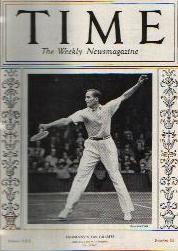
Baron Von Cramm makes the front page of Time, 1937 |
Gottfried Von Cramm (Germany 1909-1976) |
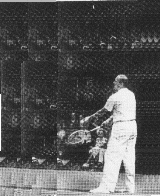
Von Cramm's excellent service |
It was in 1932 that a young German aristocrat Gottfried Von Cramm first broke onto the scene. At 23 years old, he had a typically classical style of play with the mental capacity to face anything, and excellent sportsmanship and fair play. With Daniel Prenn, a talented Russian refugee, he forged an excellent partnership that helped the German national team to reach the interzone final of the Davis Cup. Prenn gained a particularly decisive point against the British by beating Perry in the semi-final and the Germans then went on to hammer the Italians 5/0 in the next round. In the interzone final, the Americans, led by Vines, achieved a difficult win 3/2. |
| However,
this good run in the Davis Cup, was not to be repeated for the German team.
The following year, the political problems created by Hitler coming to
power forced the unfortunate Prenn to emigrate once again. He was welcomed
with open arms in England, even though he had been the lynch pin of their
defeat the previous year.
So the German team effectively lost its leader and Von Cramm was to play on, on his own in subsequent years. It was not until the arrival of another talented player, Henkel, in 1937, that the German team once again reached the interzone final. |
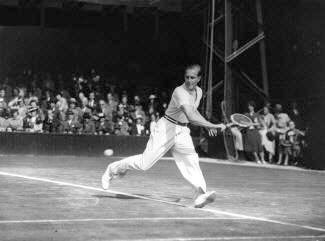 |
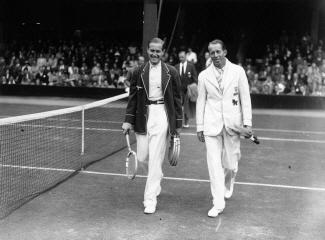
Van Cramm and Wimmer Allison: Wimbledon semi-final of 1935 |
Von
Cramm concentrated on his singles career in which he was to excel, taking
the French international at Roland-Garros in 1934. There he was to beat
the holder, the Australian Crawford,
in five hard fought sets. This confirmed him as one of the best players
in the world. The following year he became the indisputable world no. 2
behind Fred Perry, who was the only
player able to beat him wit successive confrontations in the Roland-Garros
and Wimbledon finals. In 1936 however, he finally got his revenge
on Perry, winning through at the final of Roland-Garros, to win a second
title.
Von Cramm continued to consolidate his style of play and progressed to the stage where he legitimately dreamt of winning at Wimbledon. However, his second final against Perry was a real disaster with Perry ultimately victorious in straight sets 6/1 6/1 6/0, albeit after his tearing a muscle during the first game. The Baron was really unlucky, but promised to come back to get his revenge. |
| 1937 should have been his great year. Perry had gone professional, so Von Cramm had the experience and maturity to become world champion. With the arrival of Henkel, Germany finally had a strong Davis Cup team and a victory in the competition was finally in their sights. However, it wasn’t to be. Again politics were to sadly intervene. Ever since the Olympic Games in Berlin the previous year, it had become clear that the Nazi regime intended to use its sportspeople as tools for propaganda. In the eyes of the Nazi leaders, Von Cramm represented the perfect incarnation of the Aryan demigod to inspire a youth that was already well behind Hitler. But there was a problem: the Baron was opposed to him, and made no secret of it. |
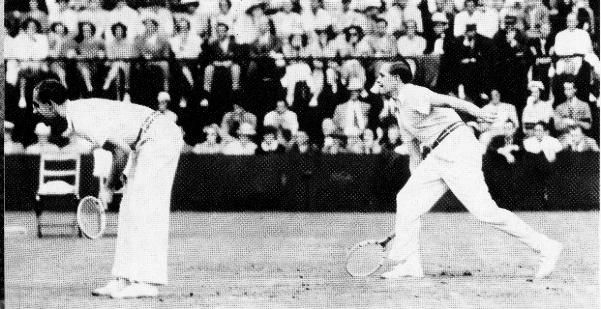
Henkel and Von Cramm were an excellent doubles team |
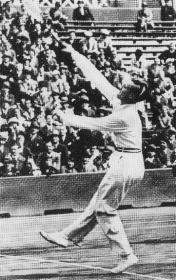 |
To make him toe the line, the German leaders refused to enter him for Roland-Garros, saying that the young Henkel would be better to represent Germany. It was true that Henkel was a patriotic German who was a party member and rigorously made the Hitler-style salute to the public and the end of each match! But let us not forget the Davis Cup. Von Cramm, who could not defend his title, was entered for the doubles with Henkel and the German leaders hired a renowned coach, the great Tilden himself. The team went from strength to strength with Henkel easily winning the singles and the doubles with Von Cramm and the German team breezing through qualification for the European final against Australia. |
| He
was favourite for Wimbledon, but ultimately met a young 21-year old American
redhead called Donald Budge. Donald was
to dash his hopes of victory. Beaten in the Wimbledon final in three sets,
Von Cramm then met the American again in the interzone final 2 weeks later
and for the decisive match. The political context was difficult for the
German, who was put under pressure by his leaders. Hitler himself called
to encourage him 5 minutes before the start of the match!
After 5 particularly intense sets, Budge, who was trailing all through the match, finally took it 6/8 5/7 6/3 6/2 8/6. "It was the best tennis match I have ever seen" Tilden said later. The Baron, disappointed and exhausted, found the strength to congratulate his opponent: "I am happy to have lost against a man like you"...
|
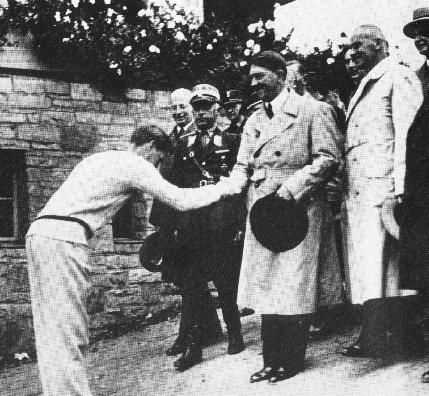
Hitler congratulates Von Cramm after a tennis match. |
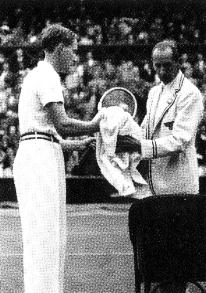
Von Cramm and his Captain Kleinschroth |
One
month later, he was once again beaten by Budge
in 5 sets at the Forest Hills final. Von Cramm did, however, have the satisfaction
of winning the doubles with Henkel, beating Budge
and Mako in straight sets, but that was little consolation compared to
the defeat in the Davis Cup. What is more, the American Budge’s domination
of world tennis was now clearly established. The Australian Championships
which followed led to still further defeats. Von Cramm was crushed by Bromwich
in the mens singles semi-finals and partnering Henkel in the mens doubles
he also went down against Quist-Bromwich in the final. To make matters
worse, this was the year that his great rival Budge finally achieved the
Grand Slam.
It was a beaten Von Crammwho
returned to Germany where he was criticised by his leaders and attacked
from all sides. Accused of being homosexual, which was an easy crime to
use at the time in Germany to get rid of an opponent, he was immediately
tried and imprisoned!
|
| He spent 1938 in prison, leaving the way open for his friend Budge to achieve the first Grand Slam in history. But during his long travels, the young American did not forget him. He had collected the signatures of 25 American sportsmen in order to send a protest letter to Hitler. Freed in May 1939, Von Cramm arrived in London to enter for Queens and Wimbledon. For once very ill-inspired, the heads of the two English clubs were extremely reluctant to accept the participation of a pariah who had just come out of prison, homosexual to boot. The fact that the accusations came from Himmler’s police, that the trial took place in a country under an ideological dictatorship with no right to defence had no effect on the boards of the two clubs. Homosexuality, genuine or false, was not yet acceptable, and simply having to say the word was enough for the German to be refused. Look at the problems encountered by Tilden in other circumstances, in that case for genuine homosexuality! |
| Following an extremely stormy meeting, the Queens committee finally accepted him by 12 votes to 11 but the Wimbledon directors would not budge. This was a real shame because the Baron probably missed his long-awaited opportunity to finally win his first Wimbledon title. He did manage to win Queens by beating a relatively unknown Bobby Riggs in the final with a convincing score of 6/1 6/0. Some two weeks later the same Mr Riggs, then a young 20-year old American, would go on to win all three Wimbledon titles, singles, men’s doubles and mixed! A new champion in the making! |
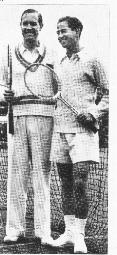
Von Cramm and Riggs before the Queens final |
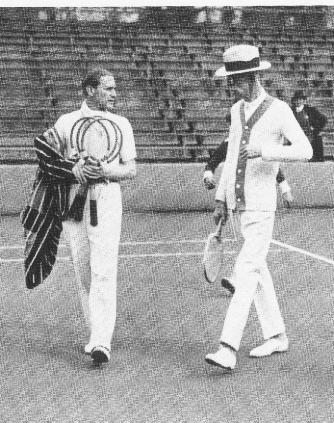
Van Cramm with Gustav V, King of Sweden and a tennis fan |
Like
everyone, Von Cramm was caught up in the turmoil of war, and was sent to
Russia as a simple soldier, injured and decorated with the iron cross.
In 1944, he was accused of being involved in the assassination attack on
Hitler and managed to survive the Gestapo interrogations. It was finally
in Sweden, where he was given refuge by King Gustav V, that he spent the
rest of the war. Von Cramm probably owes his life to the Swedish King’s
intervention with Germany. The Swiss monarch was a tennis fan, and a great
admirer of the great champions of his era, whom he liked to play doubles
with when he was staying on the Côte d'Azur. Borotra and Cochet,
in particular, were among his favourite partners.
During the Second World
War, Gustav V did not forget his friends. As well as taking in Von Cramm,
he personally intervened with the German authorities in 1942 for Borotra,
who had been arrested by the Gestapo. He thus succeeded in saving
him from an immediate death penalty...
|
| After the war,
Von Cramm returned to Germany to become a cotton importer and to look after
his farm in Hanover. As a sign of mourning for his sadness over what had
happened in his country, he wore only black ties.
Henkel disappeared to Stalingrad,
so Von Cramm became the no. 1 in his country. Banned from all international
competitions, like all German sportspeople, until the early 1950s, he made
a great comeback at Roland-Garros in 1953 at a Davis Cup match. It was
sixteen years after his first appearance. He was 44 and was beaten by the
young French hope of the day, Robert Haillet. Along with Borotra,
Von Cramm was one of the last pre-war tennis players still to be playing
at this time; and like Borotra, he
still played in trousers!!
|
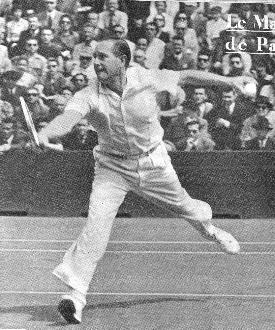
Come back to Roland-Garros, Davis Cup, 1953 |
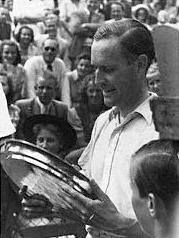
Von Cramm winning a tennis tournament in 1951 |
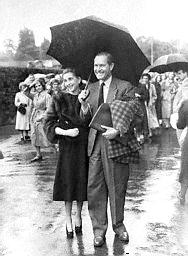
Mr and Mrs Von Cramm 1949 |
His successes in Grand Slam tournaments are summarised below : 2 mens singles, 2 mens doubles, 1 mixed doubles
| Roland-Garros | Mens Singles | 1934
1936 |
| Mens Doubles | 1937 H.Henkel | |
| Wimbledon | Mixed Doubles | 1933 H. Krahwinkel |
| Forest Hills | Mens Doubles | 1937 H.Henkel |
Des idées, des remarques, des suggestions? E-mail
E-mail
Dernière mise à jour : 24
Mai 2000
Copyright BLANCHE NET communications.
Mars 2000.